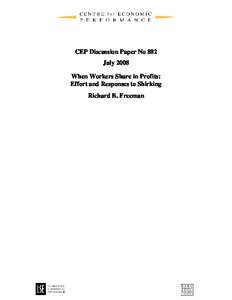When workers share in profits: effort and response to shirking
"This paper uses nationally representative linked workplace-employee data from the British 2004 Workplace Employment Relations Survey to examine the operation of shared capitalist forms of pay – profit-sharing and group pay for performance, employee share ownership, and stock options—and their...
| Main Author: | |
|---|---|
| Institution: | ETUI-European Trade Union Institute |
| Format: | TEXT |
| Language: | English |
| Published: |
London
2008
LSE |
| Subjects: | |
| Online Access: | https://www.labourline.org/KENTIKA-19180865124919080479-When-workers-share-in-profits-.htm |
| Summary: | "This paper uses nationally representative linked workplace-employee data from the British 2004 Workplace Employment Relations Survey to examine the operation of shared capitalist forms of pay – profit-sharing and group pay for performance, employee share ownership, and stock options—and their link to productivity. It shows that shared capitalism has grown in the UK, as it has in the US; that different forms of shared capitalist pay complement each other and other labour practices in the sense that firms use them together more than they would if they chose modes of pay and work practices independently; and that workplaces switch among schemes frequently, which suggests that they have trouble optimizing and the transactions cost of switching are relatively low. Among the single schemes, share ownership has the clearest positive association with productivity, but its impact is largest when firms combine it with other forms of shared capitalist pay and modes of organization." |
|---|---|
| Physical Description: | 24 p. Digital |

